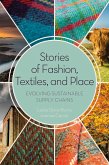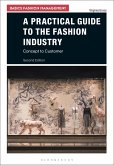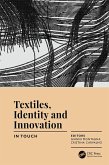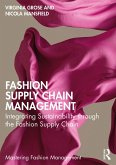Leslie Davis Burns, Jeanne Carver
Stories of Fashion, Textiles, and Place (eBook, ePUB)
Evolving Sustainable Supply Chains
20,95 €
20,95 €
inkl. MwSt.
Sofort per Download lieferbar

10 °P sammeln
20,95 €
Als Download kaufen

20,95 €
inkl. MwSt.
Sofort per Download lieferbar

10 °P sammeln
Jetzt verschenken
Alle Infos zum eBook verschenken
20,95 €
inkl. MwSt.
Sofort per Download lieferbar
Alle Infos zum eBook verschenken

10 °P sammeln
Leslie Davis Burns, Jeanne Carver
Stories of Fashion, Textiles, and Place (eBook, ePUB)
Evolving Sustainable Supply Chains
- Format: ePub
- Merkliste
- Auf die Merkliste
- Bewerten Bewerten
- Teilen
- Produkt teilen
- Produkterinnerung
- Produkterinnerung

Bitte loggen Sie sich zunächst in Ihr Kundenkonto ein oder registrieren Sie sich bei
bücher.de, um das eBook-Abo tolino select nutzen zu können.
Hier können Sie sich einloggen
Hier können Sie sich einloggen
Sie sind bereits eingeloggt. Klicken Sie auf 2. tolino select Abo, um fortzufahren.

Bitte loggen Sie sich zunächst in Ihr Kundenkonto ein oder registrieren Sie sich bei bücher.de, um das eBook-Abo tolino select nutzen zu können.
Stories of Fashion, Textiles, and Place follows the journeys of five companies with evolving sustainable supply chains in the fashion and textile industry. Each of the profiled companies are committed to advancing cultural traditions of a particular place. They value, honor, and are all deeply rooted in the geography, culture, and people of a specific location and their success is attributable to their connection to that place. With this shared value, their unique stories highlight the conditions, risks, strategies, and successes in creating and maintaining sustainable supply chains for…mehr
- Geräte: eReader
- mit Kopierschutz
- eBook Hilfe
- Größe: 18.74MB
Andere Kunden interessierten sich auch für
![Stories of Fashion, Textiles, and Place (eBook, PDF) Stories of Fashion, Textiles, and Place (eBook, PDF)]() Leslie Davis BurnsStories of Fashion, Textiles, and Place (eBook, PDF)20,95 €
Leslie Davis BurnsStories of Fashion, Textiles, and Place (eBook, PDF)20,95 €![A Practical Guide to the Fashion Industry (eBook, ePUB) A Practical Guide to the Fashion Industry (eBook, ePUB)]() Virginia GroseA Practical Guide to the Fashion Industry (eBook, ePUB)20,95 €
Virginia GroseA Practical Guide to the Fashion Industry (eBook, ePUB)20,95 €![The Fashion Show (eBook, ePUB) The Fashion Show (eBook, ePUB)]() Gill StarkThe Fashion Show (eBook, ePUB)30,95 €
Gill StarkThe Fashion Show (eBook, ePUB)30,95 €![Textiles, Identity and Innovation: In Touch (eBook, ePUB) Textiles, Identity and Innovation: In Touch (eBook, ePUB)]() Textiles, Identity and Innovation: In Touch (eBook, ePUB)115,95 €
Textiles, Identity and Innovation: In Touch (eBook, ePUB)115,95 €![Fashion Business and Digital Transformation (eBook, ePUB) Fashion Business and Digital Transformation (eBook, ePUB)]() Charlene GalleryFashion Business and Digital Transformation (eBook, ePUB)42,95 €
Charlene GalleryFashion Business and Digital Transformation (eBook, ePUB)42,95 €![Fashion Supply Chain Management (eBook, ePUB) Fashion Supply Chain Management (eBook, ePUB)]() Virginia GroseFashion Supply Chain Management (eBook, ePUB)48,95 €
Virginia GroseFashion Supply Chain Management (eBook, ePUB)48,95 €![Costing for the Fashion Industry (eBook, ePUB) Costing for the Fashion Industry (eBook, ePUB)]() Nathalie EvansCosting for the Fashion Industry (eBook, ePUB)22,95 €
Nathalie EvansCosting for the Fashion Industry (eBook, ePUB)22,95 €-
-
-
Stories of Fashion, Textiles, and Place follows the journeys of five companies with evolving sustainable supply chains in the fashion and textile industry. Each of the profiled companies are committed to advancing cultural traditions of a particular place. They value, honor, and are all deeply rooted in the geography, culture, and people of a specific location and their success is attributable to their connection to that place. With this shared value, their unique stories highlight the conditions, risks, strategies, and successes in creating and maintaining sustainable supply chains for ready-to-wear and home fashions. The companies include:
-Imperial Stock Ranch and Shaniko Wool Company - Oregon, USA
-Angela Damman Yucatán - Yucatán, Mexico
-Tonlé - Phnom Penh, Cambodia
-Indigenous Designs - Highlands, Peru
-Harris Tweed® - Outer Hebrides, Scotland, UK
With a focus on economic, social, environmental, and cultural sustainability, and the connection between textiles and place, Burns and Carver offer personal and insightful narratives of companies addressing the challenges facing today's global fashion industry.
-Imperial Stock Ranch and Shaniko Wool Company - Oregon, USA
-Angela Damman Yucatán - Yucatán, Mexico
-Tonlé - Phnom Penh, Cambodia
-Indigenous Designs - Highlands, Peru
-Harris Tweed® - Outer Hebrides, Scotland, UK
With a focus on economic, social, environmental, and cultural sustainability, and the connection between textiles and place, Burns and Carver offer personal and insightful narratives of companies addressing the challenges facing today's global fashion industry.
Produktdetails
- Produktdetails
- Verlag: Bloomsbury UK eBooks
- Seitenzahl: 208
- Erscheinungstermin: 9. September 2021
- Englisch
- ISBN-13: 9781350136366
- Artikelnr.: 62109247
- Verlag: Bloomsbury UK eBooks
- Seitenzahl: 208
- Erscheinungstermin: 9. September 2021
- Englisch
- ISBN-13: 9781350136366
- Artikelnr.: 62109247
- Herstellerkennzeichnung Die Herstellerinformationen sind derzeit nicht verfügbar.
Leslie Davis Burns is President and Founder of Responsible Global Fashion LLC and Professor Emerita of Apparel Design and Merchandising at Oregon State University. A scholar and educator around topics related to the international apparel industries, consumer behavior, and corporate social responsibility, Leslie is author of Sustainability and Social Change in Fashion (2019, Fairchild Books), Stories of Fashion, Textiles and Place (Bloomsbury Visual Arts, 2021) co-author of The Business of Fashion (6th edition, 2020, Fairchild Books) and editor of Fashion Business Cases (2020, Fairchild Books). She is also the Emeritus Editor-in-Chief of the Bloomsbury Fashion Business Cases online resource.
Preface
1. Sustainable Supply Chains in the Global Fashion Industry
Creating Value and Reflecting Values
The Value of Place
Sustainable Supply Chains
Environmental Sustainability
Social and Cultural Sustainability
Capacity Building and Employee Empowerment
Sustainable Communities
Cultural Traditions
Economic Sustainability
Supply Chain Traceability, Assurance, and Transparency
Certifications, Industry Associations, and Partnerships
Industry Initiatives, Associations, and Partnerships
Learning through Narratives
References and Resources
2. Imperial Stock Ranch and Shaniko Wool Company: Natural Adaptations
Lambing Season
Changing a Mindset: Imperial Stock Ranch, Oregon, USA
Starting a Yarn Business: Converting Sunlight Energy
From Yarn to Finished Items
Ready-to-Wear: Imperial Collection by Anna Cohen
Sustainable Bridges: East and West, Rural and Urban
The Business Naturally Adapts
"The Call"
The Power of Purpose beyond Profit
Expanding Markets
Traceability and Certification
A Sense of Place
References and Resources
3. Angela Damman Yucatán: Advancing Cultural Traditions
A Henequén Bag
The Yucatán Peninsula
Growing Up in Minnesota, USA
Moving to Yucatán
Sustainable Agriculture: Cultivating and Processing the Fiber
Processing the Fiber: Revitalizing an Industry
Shredding, Drying, Combing
Dyeing Fibers
Revitalizing the Fiber Processing Industry
Weaving and Product Development: Advancing Cultural Traditions
Facilitating Artisan Groups
A New Generation of Weavers
Markets and Retailing
Cultural Sustainability: Identity, Community, and Purpose
References and Resources
4. Tonlé
The Mekong and Tonlé Sap Rivers
Growing Up
The Dichotomy of Cambodian Textiles
A Reluctant Businesswoman
Transition and Rebranding
Zero-waste Model
The Artisan Workshop Model
The Impact and the Message of Tonlé
Today and Tomorrow
References and Resources
5. Indigenous Designs: Climbing a Mountain
Where Have You Been, My Friend?
A Brand Is Born
Climbing a Mountain
Beyond Ecuador
The Artisan Co-op Model
Economic Sustainability: Financial Strategies
Networks, Organizations, and Certifications
Documenting and Communicating Impact
Next Steps: Scaling an Artisan Ownership Model
References and Resources
6. Harris Tweed®: Às an ghearann tha an t-aodach a' tighinn / From the Land
Comes the Cloth Clò Mòr
History of the Harris Tweed Industry
Harris Tweed Act 1993 and the Harris Tweed Authority
Structure and Supply Chain of Harris Tweed
Crofting and Wool Production
Processing Wool: The Foundation of Harris Tweed
Harris Tweed Mills
Washing and Dyeing Wool
Blending, Carding, and Spinning Wool
Preparing the Warp
Textile Design
Weaving Harris Tweed
Harris Tweed Weavers
The Weaving Process
Finishing and Inspecting Harris Tweed
Marketing Harris Tweed: Power of the Orb
Marketing Harris Tweed
Markets for Harris Tweed: Tradition and Evolution
Using the Harris Tweed Label on Finished Products
Protecting the Orb
From the People Comes the Cloth
References and Resources
7. Creating and Reflecting Values through Sustainable Supply Chains
The Value of Place in Sustainable Supply Chains
The Value of People in Sustainable Supply Chains
The Value of Product in Sustainable Supply Chains
Characteristics of the Founders, CEO, Partners, and Artisans
References and Resources
Epilogue and Recommended Reading
1. Sustainable Supply Chains in the Global Fashion Industry
Creating Value and Reflecting Values
The Value of Place
Sustainable Supply Chains
Environmental Sustainability
Social and Cultural Sustainability
Capacity Building and Employee Empowerment
Sustainable Communities
Cultural Traditions
Economic Sustainability
Supply Chain Traceability, Assurance, and Transparency
Certifications, Industry Associations, and Partnerships
Industry Initiatives, Associations, and Partnerships
Learning through Narratives
References and Resources
2. Imperial Stock Ranch and Shaniko Wool Company: Natural Adaptations
Lambing Season
Changing a Mindset: Imperial Stock Ranch, Oregon, USA
Starting a Yarn Business: Converting Sunlight Energy
From Yarn to Finished Items
Ready-to-Wear: Imperial Collection by Anna Cohen
Sustainable Bridges: East and West, Rural and Urban
The Business Naturally Adapts
"The Call"
The Power of Purpose beyond Profit
Expanding Markets
Traceability and Certification
A Sense of Place
References and Resources
3. Angela Damman Yucatán: Advancing Cultural Traditions
A Henequén Bag
The Yucatán Peninsula
Growing Up in Minnesota, USA
Moving to Yucatán
Sustainable Agriculture: Cultivating and Processing the Fiber
Processing the Fiber: Revitalizing an Industry
Shredding, Drying, Combing
Dyeing Fibers
Revitalizing the Fiber Processing Industry
Weaving and Product Development: Advancing Cultural Traditions
Facilitating Artisan Groups
A New Generation of Weavers
Markets and Retailing
Cultural Sustainability: Identity, Community, and Purpose
References and Resources
4. Tonlé
The Mekong and Tonlé Sap Rivers
Growing Up
The Dichotomy of Cambodian Textiles
A Reluctant Businesswoman
Transition and Rebranding
Zero-waste Model
The Artisan Workshop Model
The Impact and the Message of Tonlé
Today and Tomorrow
References and Resources
5. Indigenous Designs: Climbing a Mountain
Where Have You Been, My Friend?
A Brand Is Born
Climbing a Mountain
Beyond Ecuador
The Artisan Co-op Model
Economic Sustainability: Financial Strategies
Networks, Organizations, and Certifications
Documenting and Communicating Impact
Next Steps: Scaling an Artisan Ownership Model
References and Resources
6. Harris Tweed®: Às an ghearann tha an t-aodach a' tighinn / From the Land
Comes the Cloth Clò Mòr
History of the Harris Tweed Industry
Harris Tweed Act 1993 and the Harris Tweed Authority
Structure and Supply Chain of Harris Tweed
Crofting and Wool Production
Processing Wool: The Foundation of Harris Tweed
Harris Tweed Mills
Washing and Dyeing Wool
Blending, Carding, and Spinning Wool
Preparing the Warp
Textile Design
Weaving Harris Tweed
Harris Tweed Weavers
The Weaving Process
Finishing and Inspecting Harris Tweed
Marketing Harris Tweed: Power of the Orb
Marketing Harris Tweed
Markets for Harris Tweed: Tradition and Evolution
Using the Harris Tweed Label on Finished Products
Protecting the Orb
From the People Comes the Cloth
References and Resources
7. Creating and Reflecting Values through Sustainable Supply Chains
The Value of Place in Sustainable Supply Chains
The Value of People in Sustainable Supply Chains
The Value of Product in Sustainable Supply Chains
Characteristics of the Founders, CEO, Partners, and Artisans
References and Resources
Epilogue and Recommended Reading
Preface
1. Sustainable Supply Chains in the Global Fashion Industry
Creating Value and Reflecting Values
The Value of Place
Sustainable Supply Chains
Environmental Sustainability
Social and Cultural Sustainability
Capacity Building and Employee Empowerment
Sustainable Communities
Cultural Traditions
Economic Sustainability
Supply Chain Traceability, Assurance, and Transparency
Certifications, Industry Associations, and Partnerships
Industry Initiatives, Associations, and Partnerships
Learning through Narratives
References and Resources
2. Imperial Stock Ranch and Shaniko Wool Company: Natural Adaptations
Lambing Season
Changing a Mindset: Imperial Stock Ranch, Oregon, USA
Starting a Yarn Business: Converting Sunlight Energy
From Yarn to Finished Items
Ready-to-Wear: Imperial Collection by Anna Cohen
Sustainable Bridges: East and West, Rural and Urban
The Business Naturally Adapts
"The Call"
The Power of Purpose beyond Profit
Expanding Markets
Traceability and Certification
A Sense of Place
References and Resources
3. Angela Damman Yucatán: Advancing Cultural Traditions
A Henequén Bag
The Yucatán Peninsula
Growing Up in Minnesota, USA
Moving to Yucatán
Sustainable Agriculture: Cultivating and Processing the Fiber
Processing the Fiber: Revitalizing an Industry
Shredding, Drying, Combing
Dyeing Fibers
Revitalizing the Fiber Processing Industry
Weaving and Product Development: Advancing Cultural Traditions
Facilitating Artisan Groups
A New Generation of Weavers
Markets and Retailing
Cultural Sustainability: Identity, Community, and Purpose
References and Resources
4. Tonlé
The Mekong and Tonlé Sap Rivers
Growing Up
The Dichotomy of Cambodian Textiles
A Reluctant Businesswoman
Transition and Rebranding
Zero-waste Model
The Artisan Workshop Model
The Impact and the Message of Tonlé
Today and Tomorrow
References and Resources
5. Indigenous Designs: Climbing a Mountain
Where Have You Been, My Friend?
A Brand Is Born
Climbing a Mountain
Beyond Ecuador
The Artisan Co-op Model
Economic Sustainability: Financial Strategies
Networks, Organizations, and Certifications
Documenting and Communicating Impact
Next Steps: Scaling an Artisan Ownership Model
References and Resources
6. Harris Tweed®: Às an ghearann tha an t-aodach a' tighinn / From the Land
Comes the Cloth Clò Mòr
History of the Harris Tweed Industry
Harris Tweed Act 1993 and the Harris Tweed Authority
Structure and Supply Chain of Harris Tweed
Crofting and Wool Production
Processing Wool: The Foundation of Harris Tweed
Harris Tweed Mills
Washing and Dyeing Wool
Blending, Carding, and Spinning Wool
Preparing the Warp
Textile Design
Weaving Harris Tweed
Harris Tweed Weavers
The Weaving Process
Finishing and Inspecting Harris Tweed
Marketing Harris Tweed: Power of the Orb
Marketing Harris Tweed
Markets for Harris Tweed: Tradition and Evolution
Using the Harris Tweed Label on Finished Products
Protecting the Orb
From the People Comes the Cloth
References and Resources
7. Creating and Reflecting Values through Sustainable Supply Chains
The Value of Place in Sustainable Supply Chains
The Value of People in Sustainable Supply Chains
The Value of Product in Sustainable Supply Chains
Characteristics of the Founders, CEO, Partners, and Artisans
References and Resources
Epilogue and Recommended Reading
1. Sustainable Supply Chains in the Global Fashion Industry
Creating Value and Reflecting Values
The Value of Place
Sustainable Supply Chains
Environmental Sustainability
Social and Cultural Sustainability
Capacity Building and Employee Empowerment
Sustainable Communities
Cultural Traditions
Economic Sustainability
Supply Chain Traceability, Assurance, and Transparency
Certifications, Industry Associations, and Partnerships
Industry Initiatives, Associations, and Partnerships
Learning through Narratives
References and Resources
2. Imperial Stock Ranch and Shaniko Wool Company: Natural Adaptations
Lambing Season
Changing a Mindset: Imperial Stock Ranch, Oregon, USA
Starting a Yarn Business: Converting Sunlight Energy
From Yarn to Finished Items
Ready-to-Wear: Imperial Collection by Anna Cohen
Sustainable Bridges: East and West, Rural and Urban
The Business Naturally Adapts
"The Call"
The Power of Purpose beyond Profit
Expanding Markets
Traceability and Certification
A Sense of Place
References and Resources
3. Angela Damman Yucatán: Advancing Cultural Traditions
A Henequén Bag
The Yucatán Peninsula
Growing Up in Minnesota, USA
Moving to Yucatán
Sustainable Agriculture: Cultivating and Processing the Fiber
Processing the Fiber: Revitalizing an Industry
Shredding, Drying, Combing
Dyeing Fibers
Revitalizing the Fiber Processing Industry
Weaving and Product Development: Advancing Cultural Traditions
Facilitating Artisan Groups
A New Generation of Weavers
Markets and Retailing
Cultural Sustainability: Identity, Community, and Purpose
References and Resources
4. Tonlé
The Mekong and Tonlé Sap Rivers
Growing Up
The Dichotomy of Cambodian Textiles
A Reluctant Businesswoman
Transition and Rebranding
Zero-waste Model
The Artisan Workshop Model
The Impact and the Message of Tonlé
Today and Tomorrow
References and Resources
5. Indigenous Designs: Climbing a Mountain
Where Have You Been, My Friend?
A Brand Is Born
Climbing a Mountain
Beyond Ecuador
The Artisan Co-op Model
Economic Sustainability: Financial Strategies
Networks, Organizations, and Certifications
Documenting and Communicating Impact
Next Steps: Scaling an Artisan Ownership Model
References and Resources
6. Harris Tweed®: Às an ghearann tha an t-aodach a' tighinn / From the Land
Comes the Cloth Clò Mòr
History of the Harris Tweed Industry
Harris Tweed Act 1993 and the Harris Tweed Authority
Structure and Supply Chain of Harris Tweed
Crofting and Wool Production
Processing Wool: The Foundation of Harris Tweed
Harris Tweed Mills
Washing and Dyeing Wool
Blending, Carding, and Spinning Wool
Preparing the Warp
Textile Design
Weaving Harris Tweed
Harris Tweed Weavers
The Weaving Process
Finishing and Inspecting Harris Tweed
Marketing Harris Tweed: Power of the Orb
Marketing Harris Tweed
Markets for Harris Tweed: Tradition and Evolution
Using the Harris Tweed Label on Finished Products
Protecting the Orb
From the People Comes the Cloth
References and Resources
7. Creating and Reflecting Values through Sustainable Supply Chains
The Value of Place in Sustainable Supply Chains
The Value of People in Sustainable Supply Chains
The Value of Product in Sustainable Supply Chains
Characteristics of the Founders, CEO, Partners, and Artisans
References and Resources
Epilogue and Recommended Reading







